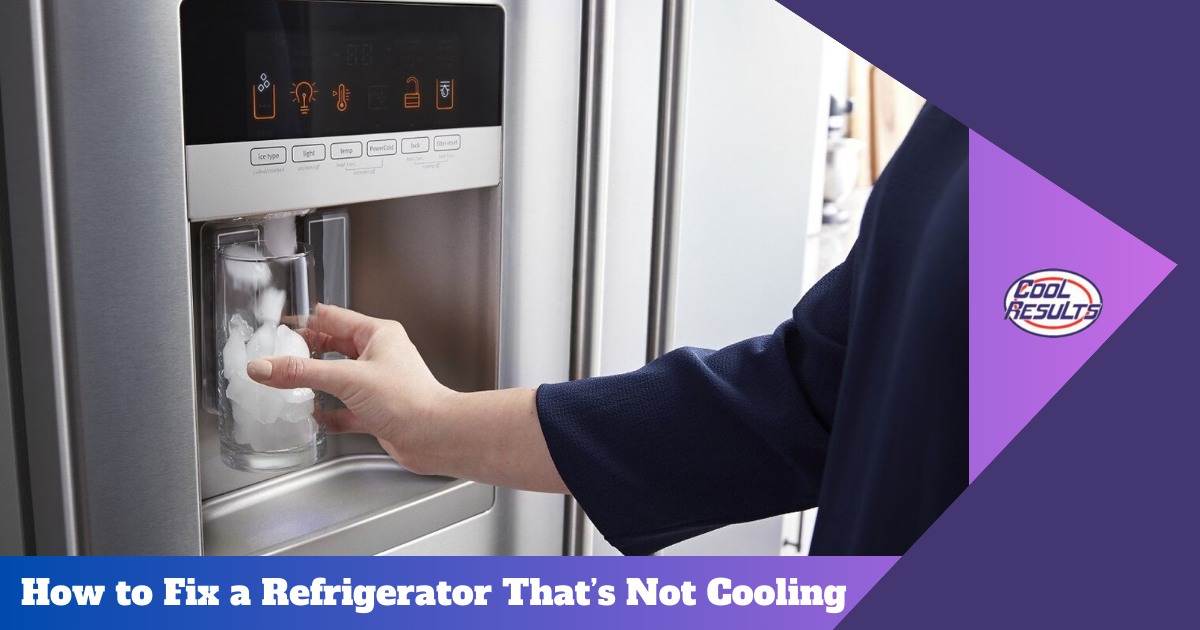Do you find the perishables in your refrigerator getting spoiled within a day or two? Or are you getting a foul smell from the milk stored in the fridge? If yes, it’s time to pay attention to your refrigerator.
These signs are common indicators that your refrigerator has stopped cooling or is not cooling properly. You might be asking yourself, ‘Why is my fridge not cooling?’ Rest assured, you’re not alone in this. There are numerous reasons for your refrigerator not cooling and countless ways of troubleshooting the fridge not cooling.
Read on as we discuss how to fix a refrigerator that’s not cooling properly, the possible reasons for the same, and more.
Why is my fridge not cooling?
- Faulty Thermostat: The thermostat regulates the temperature to keep food fresh. A faulty thermostat fails to signal the compressor to begin operating, resulting in inadequate cooling.
- Dirty Condenser Coils: Over time, dust, dirt, and debris can accumulate on the condenser coils, hindering heat dissipation and causing the compressor to work harder. This can lead to poor cooling performance.
- Damaged Door Seals: A tight seal is crucial for maintaining the internal temperature of your fridge. Cracked or worn door seals allow cold air to escape, forcing the compressor to work overtime to maintain the set temperature.
- Blocked Air Vents: Proper airflow is essential for even cooling throughout the refrigerator. Food items or ice buildup can block air vents, disrupting this airflow and resulting in inconsistent temperatures.
- Defective Evaporator Fan: The evaporator fan circulates cold air from the freezer to the refrigerator compartment. If it’s malfunctioning or blocked by ice accumulation, the fridge may not cool properly, despite the freezer working fine.
- Low Refrigerant Levels: Refrigerant is the substance that absorbs heat from inside the fridge and transfers it to the condenser coils. If there’s a leak or low refrigerant levels, the appliance’s cooling efficiency will be affected.
- Compressor Issues: The compressor is responsible for compressing the refrigerant and initiating the cooling cycle. The fridge may struggle to maintain the desired temperature if it’s faulty or failing.
- Overcrowded Interior: Packing your fridge to the brim can impede airflow and prevent cold air from circulating properly. Ensure there’s enough space between items for optimal cooling performance.
- Power Supply Problems: Sometimes, the issue might not be from the refrigerator itself. Check if the power outlet is working correctly and if there are any issues with the electrical supply to the appliance.
- Environmental Factors: Extreme ambient temperatures from placing the fridge in direct sunlight or near a heat source can affect its cooling efficiency. Ensure the refrigerator is placed in a well-ventilated area away from direct heat sources.
How to fix a Refrigerator that is not cooling?
Wondering how to repair a fridge that is not cooling properly? Here are the ways to fix a faulty fridge:
- Check the Thermostat: Adjust the thermostat to a lower setting and listen to the compressor start operating. If it doesn’t, the thermostat may be faulty and need replacement. Consult your refrigerator’s manual for instructions on how to replace it.
- Clean the Condenser Coils: Disconnect the refrigerator and locate the condenser coils, usually found at the back or bottom of the appliance. Use a vacuum cleaner with a brush attachment or a coil cleaning brush to remove any dust, dirt, or debris that may obstruct airflow.
- Inspect the Door Seals: Check the door seals for cracks, tears, or gaps that may allow cold air to escape. Replace damaged seals to ensure a tight seal and proper insulation.
- Clear Blocked Air Vents: Remove any obstructions from the air vents inside the refrigerator and freezer compartments. This includes rearranging food items to ensure proper airflow and melting ice buildup with a hairdryer set to low heat.
- Test the Evaporator Fan: Open the freezer compartment and listen for the sound of the evaporator fan running. If it’s not working, it may need to be replaced. Consult your refrigerator’s manual or seek professional assistance for fan replacement.
- Check Refrigerant Levels: While checking refrigerant levels requires specialized equipment and expertise, you can look for signs of a refrigerant leak, such as oil or frost buildup on the coils. If you suspect a leak, contact a qualified technician to inspect and repair the issue.
- Inspect the Compressor: Listen for any unusual noises from the compressor, such as clicking or humming. It may be defective and require professional repair or replacement if it’s not running or making strange sounds.
- Organize the Interior: Remove any excess food items and rearrange the refrigerator’s contents for proper airflow. Avoid overcrowding shelves and ensure there’s space between items for air circulation.
- Check the Power Supply: Ensure the refrigerator is plugged into a working power outlet and there are no electrical supply issues. Test the outlet with another appliance to rule out electrical problems.
- Monitor Environmental Factors: Avoid placing the refrigerator in direct sunlight or near heat sources like ovens or radiators. Ensure it’s placed in a well-ventilated area with adequate clearance around the appliance.
- Professional Assistance: If you’ve tried the above steps and your refrigerator isn’t cooling properly, it may be time to seek professional assistance. Contact the manufacturer or a qualified appliance repair technician to diagnose and fix the issue.
Conclusion
These troubleshooting steps can help you identify and resolve the underlying issues causing your refrigerator to malfunction. Regular maintenance and proper care can also prevent future cooling problems and extend the lifespan of your appliance.
If in doubt, don’t hesitate to seek professional help from our Cool Result technicians to ensure your refrigerator runs at peak performance.

